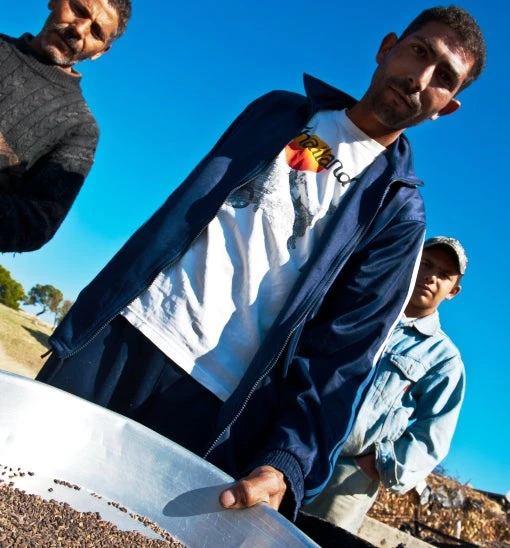Our new series, Stories from the Unfinished Revolution is based on interviews conducted for the World Bank’s new report: The Unfinished Revolution: Bringing Opportunity, Good Jobs and Greater Wealth to All Tunisians.
 Hassen Abidi crumbles a sickly-looking ear of wheat in his hand. He doesn't need an agronomist to tell him it's infected with a fungal blight known to local farmers as “
septoria”. "I know more about growing things than any doctor knows about medicine, but I'm at my wit's end with all this," he says. "I sometimes wonder why I carry on planting."
Hassen Abidi crumbles a sickly-looking ear of wheat in his hand. He doesn't need an agronomist to tell him it's infected with a fungal blight known to local farmers as “
septoria”. "I know more about growing things than any doctor knows about medicine, but I'm at my wit's end with all this," he says. "I sometimes wonder why I carry on planting."
This year he and his friends had no cash for pesticides or for repairing the broken pump that is part of an aging irrigation system. For their melons and tomatoes, they will have to bring water by truck from a cistern some distance away. It is two years now since they rented these 37 acres (15 hectares) from other locals under simple verbal agreements. At 1,000 dinars per hectare, they need to find 15,000 dinars (about 6,750 euros or US$8,670) annually for rent.
Their low-volume business is on the brink of failure. This year, tomato seedlings have been supplied on credit by a company producing tomato paste, which also lent planting machinery and will provide pesticides on credit for the tomatoes. But, as producers, their margins leave little cash for other expenditures, said Abidi. Even the plastic to cover the melons has been a major expense.
Agricultural economists estimate that farmers like Abidi could gain from moving into higher-end products, such as sun-dried tomatoes or organic vegetables which have a mark-up on European tables. For this, however, Abidi would need advice about the shifting tastes of European consumers. "We know about growing things. We're ready to work day and night. What we don't have is the support."
Agriculture in Tunisia has immense untapped potential according to a new report from the World Bank, The Unfinished Revolution: Bringing Opportunity, Good Jobs and Greater Wealth to All Tunisians. Current policies are focused on food security and encourage the production of wheat and dairy, in which – quite apart from being water-intensive - the country has no comparative advantage. This strategy is supported by agricultural subsidies that mostly benefit large landowners in coastal areas. A shift towards Mediterranean crops such as olive oil and dried fruits, in which Tunisia has a strong comparative advantage and broadening out of support, could increase economic growth by one percent of Gross Domestic Product. Equally important, it would benefit 70 percent of all farmers and be a boon to the poorer interior regions of the country.
Elsewhere, in central Tunisia, 40 miles (65 km) inland from the port city of Sfax, Mohamed Messaoudi knows that the olives, seedless table grapes, and early peach varieties he produces, are high quality. Part of his crop has already been certified “organic”. The olive oil he produces at his Italian-made press is sold in bulk either to the official Vegetable Oils Marketing Board ( Office National des Huiles, ONH), or to an exporter in Sfax—whose range includes extra-virgin oils infused with lemon, basil, and garlic.
Messaoudi wants to add more of that value himself out here in the fields. And he knows that—despite the fact that Tunisia is recognized for the good quality of its olive oil—Tunisia is still using only 20 percent of its quota of exports to the European Union.
But for more than a year, he looked for 600,000 Tunisian dinars (US$350,000) he needed to borrow to set up a bottling and marketing plant that would allow him to export directly. Bank lending at affordable rates was not forthcoming. Nor are internet speeds good for global business: he spends his evenings running his business from the Publinet public Internet café in Regueb. Even just outside of towns, internet connections are too slow and sporadic to allow for effective work.
Nonetheless, Messaoudi plans to invest in packaging his fruit and vegetables. "I have plenty of contacts in Libya and Algeria. They are ready to take my produce but they need it properly packaged."
 Hassen Abidi crumbles a sickly-looking ear of wheat in his hand. He doesn't need an agronomist to tell him it's infected with a fungal blight known to local farmers as “
septoria”. "I know more about growing things than any doctor knows about medicine, but I'm at my wit's end with all this," he says. "I sometimes wonder why I carry on planting."
Hassen Abidi crumbles a sickly-looking ear of wheat in his hand. He doesn't need an agronomist to tell him it's infected with a fungal blight known to local farmers as “
septoria”. "I know more about growing things than any doctor knows about medicine, but I'm at my wit's end with all this," he says. "I sometimes wonder why I carry on planting."
This year he and his friends had no cash for pesticides or for repairing the broken pump that is part of an aging irrigation system. For their melons and tomatoes, they will have to bring water by truck from a cistern some distance away. It is two years now since they rented these 37 acres (15 hectares) from other locals under simple verbal agreements. At 1,000 dinars per hectare, they need to find 15,000 dinars (about 6,750 euros or US$8,670) annually for rent.
Their low-volume business is on the brink of failure. This year, tomato seedlings have been supplied on credit by a company producing tomato paste, which also lent planting machinery and will provide pesticides on credit for the tomatoes. But, as producers, their margins leave little cash for other expenditures, said Abidi. Even the plastic to cover the melons has been a major expense.
Agricultural economists estimate that farmers like Abidi could gain from moving into higher-end products, such as sun-dried tomatoes or organic vegetables which have a mark-up on European tables. For this, however, Abidi would need advice about the shifting tastes of European consumers. "We know about growing things. We're ready to work day and night. What we don't have is the support."
Agriculture in Tunisia has immense untapped potential according to a new report from the World Bank, The Unfinished Revolution: Bringing Opportunity, Good Jobs and Greater Wealth to All Tunisians. Current policies are focused on food security and encourage the production of wheat and dairy, in which – quite apart from being water-intensive - the country has no comparative advantage. This strategy is supported by agricultural subsidies that mostly benefit large landowners in coastal areas. A shift towards Mediterranean crops such as olive oil and dried fruits, in which Tunisia has a strong comparative advantage and broadening out of support, could increase economic growth by one percent of Gross Domestic Product. Equally important, it would benefit 70 percent of all farmers and be a boon to the poorer interior regions of the country.
Elsewhere, in central Tunisia, 40 miles (65 km) inland from the port city of Sfax, Mohamed Messaoudi knows that the olives, seedless table grapes, and early peach varieties he produces, are high quality. Part of his crop has already been certified “organic”. The olive oil he produces at his Italian-made press is sold in bulk either to the official Vegetable Oils Marketing Board ( Office National des Huiles, ONH), or to an exporter in Sfax—whose range includes extra-virgin oils infused with lemon, basil, and garlic.
Messaoudi wants to add more of that value himself out here in the fields. And he knows that—despite the fact that Tunisia is recognized for the good quality of its olive oil—Tunisia is still using only 20 percent of its quota of exports to the European Union.
But for more than a year, he looked for 600,000 Tunisian dinars (US$350,000) he needed to borrow to set up a bottling and marketing plant that would allow him to export directly. Bank lending at affordable rates was not forthcoming. Nor are internet speeds good for global business: he spends his evenings running his business from the Publinet public Internet café in Regueb. Even just outside of towns, internet connections are too slow and sporadic to allow for effective work.
Nonetheless, Messaoudi plans to invest in packaging his fruit and vegetables. "I have plenty of contacts in Libya and Algeria. They are ready to take my produce but they need it properly packaged."



Join the Conversation